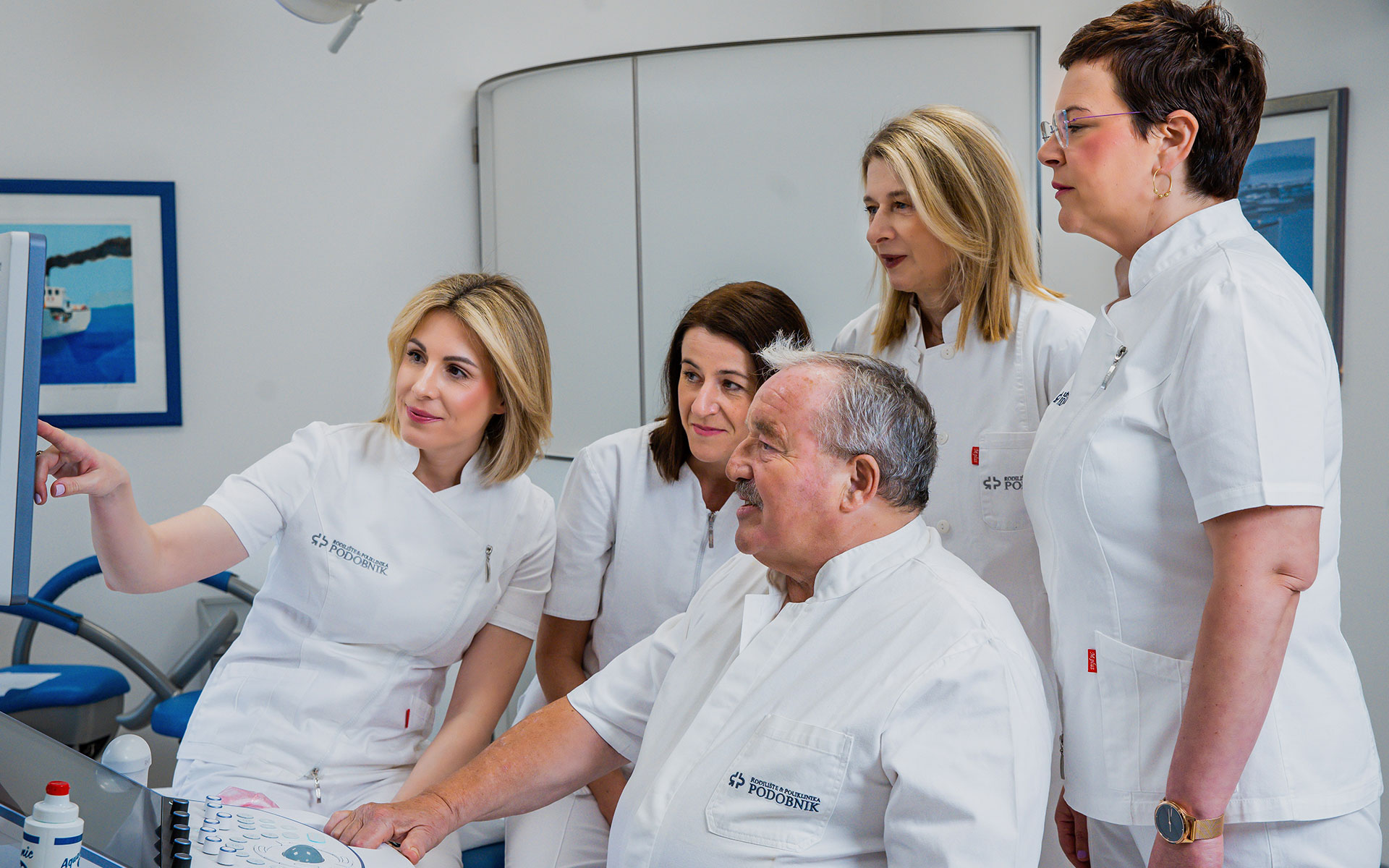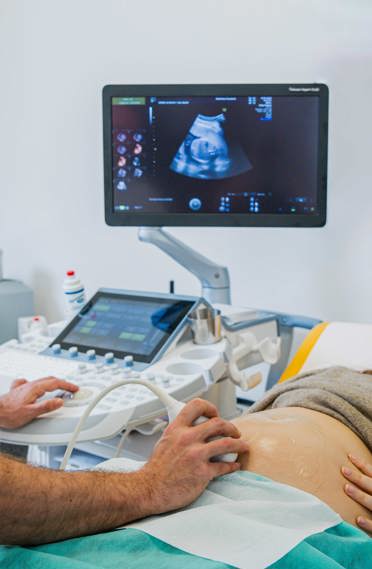
Experience and technology
Pregnancy is a special condition for every mother and family, during which a number of emotions emerge - from happiness to worry and fears about whether the course and outcome of pregnancy will be orderly. Our team of experienced doctors specialized in fetal medicine and pregnancy pathology place their knowledge at your disposal. All our outpatient clinics are equipped with the most technologically advanced 4D/5D GE Voluson devices of the new generation, necessary for high-quality and detailed fetal diagnostics. What’s more, our doctors constantly expand their know-how through continuous education to provide you with a first-class experience.
Pregnancy management
With excellence and dedication, we are at your disposal for numerous services: for the management of the entire pregnancy or only for crucial ultrasound examinations, prenatal tests and diagnostics. Our experts in fetal medicine are ready to provide knowledge and support during pregnancy to our expecting mothers. For regular pregnancy check-ups, we devote a lot of time to you without haste, and doctors are available to answer all your questions by e-mail or by phone. With our emergency 24-hour service, you will feel safe at all times. During your pregnancy, you will become familiar with our staff and facilities, and gain a sense of belonging and trust.

-
 the most advanced 4D/5D ultrasound diagnostics
the most advanced 4D/5D ultrasound diagnostics
-
 24-hour patient care
24-hour patient care
-
 counseling and support in case of complications during pregnancy
counseling and support in case of complications during pregnancy
-
 longer pregnancy appointments for a detailed ultra-sound examination
longer pregnancy appointments for a detailed ultra-sound examination

US in pregnancy
Podobnik Special Hospital performs pregnancy examinations using state-of-the-art 4D/5D ultrasound machines, and it is the only hospital in Croatia with all its clinics equipped exclusively with high-resolution GE Voluson devices. The medical importance of 4D imaging goes beyond beautiful images of the external appearance of the fetus, head and face. These cutting-edge devices allow us to have a detailed view of the skeletal system, brain (TUI), heart (STIC), internal organs, circulatory system (Power Doppler) and are indispensable in the early detection of fetal malformations. All images are stored in the device's memory, and subsequently they can be further processed by computers for more accurate analysis, i.e for as accurate as possible measurements and as clear as possible diagnostics.
Unlike 3D imaging, 4D/5D ultrasound imaging provides incomparably more detailed insights into fetal morphology and anatomy, and also fetal dynamics and condition. It is possible to evaluate the anatomy of the fetus in detail very early, already in the first trimester of pregnancy, and later during pregnancy to obtain extraordinary insight into the fine morphology and behavior of the fetus. We save images and videos of each examination on a USB memory stick, and we can also send them to your e-mail address.
Gynecologists at the Podobnik Special Hospital have many years of experience in ultrasound diagnostics. After completing a specialized course in 3D/4D ultrasound diagnostics in Vienna and gaining many years of experience during clinical work, they have become educators who have trained many doctors in Croatia and neighboring countries thanks to their knowledge and experience.
Prenatal diagnostics
For the timely detection of possible chromosomal abnormalities and malformations of the fetus, pregnant women are recommended to undergo a combined first trimester screening between the 11th and 14th week of pregnancy. The combined first trimester screening is the most effective method for determining the presence of Down syndrome and other chromosomal abnormalities; it detects approximately 90% of pregnancies with detected Down syndrome and chromosomal abnormalities.
Chromosomal abnormalities and fetal malformations are one of the main causes of perinatal mortality and morbidity. Although the vast majority of children are completely healthy, congenital anomalies occur in 3-5% of all newborns. One in a hundred children has a physical or mental handicap, with Down syndrome (an extra chromosome 21) being among the most common cause of this condition. Every woman carries the risk of giving birth to a child with Down syndrome or another chromosomal abnormality, but it is higher in older pregnant women. Read more.
The NIPT prenatal test is a non-invasive method for detecting possible fetal chromosomal trisomies after the 10th week of pregnancy. It is based on taking venous blood and further analysis of fetal DNA from the mother's blood. The test is completely harmless for both the pregnant woman and the fetus. The test cannot detect genetic mutations, chromosomal mosaicism and structural chromosomal abnormalities. With the non-invasive NIPT test, we determine the absence or possible presence of trisomies in the fetus without any risk and with a reliability exceeding 99%.
With the non-invasive NIPT test, we determine the presence or absence of the trisomy of chromosomes 21, 18, 13 and sex-linked chromosomal abnormalities. The reliability of the test exceeds 99%. A negative test result usually means that the pregnant woman is carrying a healthy fetus and that no other tests are required. If the result is positive, it is very likely that trisomy is present. In this case, the pregnant woman is advised to undergo additional testing that can confirm or deny the suspicion. Read more.
Invasive prenatal diagnostic testing includes methods used to perform fetal chromosome analysis. Such an analysis proves or excludes chromosomal anomalies, congenital metabolic disorders and hereditary conditions linked to the X-chromosome.
Congenital anomalies occur in 3-5% of all newborns, and arise as a result of chromosomal abnormalities, complications during pregnancy (intrauterine infection) or for unknown reasons. Invasive prenatal procedures (amniocentesis and chorionic villus sampling - CVS) are the only way to reliably confirm or exclude the diagnosis of Down syndrome or some other chromosomal abnormality. Read more.
FAQ:
odnosno oko 6-og tjedna trudnoće kad moramo utvrditi uredan razvoj trudnoće u maternici. Sljedeći ključni ultrazvučni pregled se radi s 12 tjedana kad radimo miny anomaly scan i neko od testiranja na kromosomske greške ukoliko se trudnica odluči na to. Pregledi su obično svaka 4 tjedna te uključuju detaljan ultrazvučni pregled i određivanje laboratorijskih pretraga te savjetovanje oko nalaza.
S 20 tjedana trudnoće se radi detaljan pregled morfologije ploda – miny anomaly scan. Nakon 35-og tjedna uz ultrazvučni pregled obično radimo i CTG zapis koji snima frekvenciju srca bebe i aktivnost maternice. Zatim pregledi postaju češći, te nakon 37-og tjedna se odvijaju u tjednim razmacima do poroda. Na tim zadnjim pregledima uvijek radimo CTG zapis, ultrazvučnu procjenu veličine i položaja djeteta te biofizikalni profil (kolekciju plodove vode, zrelost posteljice i dopplerske protoke u fetalnim krvnim žilama) kako bismo dogovarali plan za porod. U slučaju nekih iznenadnih događanja tijekom trudnoće, našim pacijenticama je uvijek dostupna naša služba 24 sata dnevno za hitni pregled.

